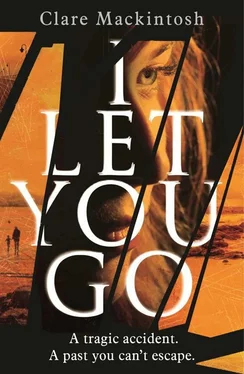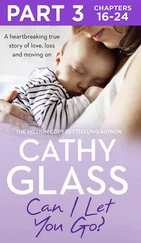Whatever you do, don’t open the doors.
What’s in there he doesn’t want me to see? I look over my shoulder, as though he might walk in at any moment, and pull open the door decisively. Immediately something falls towards me and I gasp, putting out a hand and catching a vase before it falls on to the tiled floor and shatters. I replace it among the jumble of glassware; the air inside the dresser is perfumed with a trace of musty lavender from the stacked linen within. There is nothing sinister here: just a collection of memories.
I am about to close the door when I see the silver edge of a photo frame protruding from between a pile of tablecloths. I pull it out carefully. It’s a photo of Patrick, his arm around a woman with short blonde hair and straight white teeth. They are both smiling, not at the camera, but at each other. I wonder who she is, and why Patrick has hidden the photo from me. Is this the woman he thought he was going to marry? I look at the photo, trying to find something that will tell me when it was taken. Patrick looks the same as he does now, and I wonder if this woman is in his past, or still a part of his life. Perhaps I’m not the only one keeping secrets. I replace the photo frame between the tablecloths and shut the cupboard door, leaving the contents as I found them.
I pace the kitchen, but grow tired of my restlessness, and make a cup of tea, which I sit at the table to drink.
The rain stings my face, blurring my eyes and filling my vision with shadowy shapes. I can barely hear the noise of the engine above the wind, but still I hear the thud as he hits the bonnet, the slam as he smashes on to the tarmac.
And then suddenly the water in my eyes isn’t rain, but seawater. And the engine isn’t a car, but the chug chug chug of the lifeboat. And although the scream is my own, the face that looks up at me – the dark pools of eyes with their clumps of wet lashes – that face isn’t Jacob’s, but Patrick’s.
‘I’m sorry,’ I say, unsure if I am speaking out loud, ‘I never meant—’
I feel a hand shake my shoulder, pulling me roughly from sleep. Confused, I raise my head from my folded arms, the square of wooden table still warm from my breath, and feel the chill of the kitchen hit my face. I screw up my eyes against the harsh electric light, pulling up my arm to cover my face. ‘No!’
‘Jenna, wake up. Jenna, you’re dreaming.’
Slowly, I drop my arm, opening my eyes to see Patrick kneeling in front of my chair. I open my mouth, but can’t speak, hungover from my nightmare and overwhelmed with relief that he is there.
‘What were you dreaming about?’
I drag the words together. ‘I – I’m not sure. I was frightened.’
‘You don’t have to be frightened any more,’ Patrick says, and he smooths the damp hair from my temples and cups my face between his hands. ‘I’m here.’
His face is pale, and there is rain on his hair and clinging to his eyelashes. His eyes, which usually seem so full of light, are empty and dark. He looks broken, and without stopping to think, I lean forward and kiss him on the lips. He responds hungrily, holding my face in his hands, then he suddenly releases me and rests his forehead against mine.
‘They called off the search.’
‘Called it off? You mean they’re still missing?’
Patrick nods, and I see the weight of emotion fill his eyes. He sinks back on to his heels. ‘We’ll go out again at first light,’ he says, flatly, ‘but no one’s pretending any more.’ Then he closes his eyes and rests his head on my lap, and weeps openly for the father and teenage son who had so confidently taken out their boat despite all the warning signs.
I stroke his hair and let my own tears fall. I cry for a teenage boy alone in the sea; I cry for his mother; I cry for the dreams that haunt my nights; for Jacob; for my baby boy.
19
It is Christmas Eve when the bodies are washed up, days after Patrick and the rest of the crew have stopped searching for them. I had naively assumed they would appear together, but I should have known by now the tide is never predictable. The son came first, carried gently into Rhossili Bay by a rippling sea that seemed too mild to have inflicted the terrible injuries seen on his father, washed up a mile down the coast.
We are on the beach when Patrick gets the call, and I know from his grimly set jaw that the news is not good. He walks a little away from me, as if to shield me, and turns to stare at the sea as he listens in silence to David. After he finishes the call, he stays rooted to the spot, scanning the horizon as if searching for answers. I walk over to him and place my hand on his arm, and he jumps, as though he has forgotten I was there at all.
‘I’m so sorry,’ I say, hopelessly trying to find the right words.
‘I was seeing a girl,’ he says, still looking out to sea. ‘I met her at university and we lived together in Leeds.’
I listen, unsure where this is going.
‘When I came back here I brought her with me. She didn’t want to come, but we didn’t want to be apart, so she gave up her job and came to live in Port Ellis with me. She hated it. It was too small, too quiet, too slow for her.’
I feel a sense of discomfort, as though I am intruding. I want to tell him to stop talking, that he doesn’t need to tell me this, but it’s as if he can’t stop.
‘We had a row one day, in the middle of summer. It was the same old argument: she wanted to return to Leeds, I wanted to stay here and build up the practice. She stormed off and went down to the beach to surf, but she got caught in a riptide and never came back.’
‘Oh God, Patrick.’ There is a lump in my throat. ‘How awful.’
He finally turns to look at me. ‘Her surfboard washed up the next day, but we never found her body.’
‘“We”,’ I say. ‘You searched for her yourself?’ I can’t imagine how painful that must have been.
He shrugged. ‘We all did. That’s our job, isn’t it?’
‘Yes, but…’ I trail off. Of course he searched for her – how could he not?
I put my arms around Patrick and he leans into me, his face pressed into my neck. I had imagined his life to be perfect: for there to be nothing more to him than the funny, easy-going persona he presents. But the ghosts he battles are as real as my own. For the first time I’m with someone who needs me as much as I need him.
We walk slowly to the cottage, where Patrick tells me to wait for him while he fetches something from his car.
‘What is it?’ I say, intrigued.
‘You’ll see.’ The sparkle is back in his eyes now, and I marvel at his ability to cope with such sadness in his life. I wonder if it’s the passing years that have given him the strength, and hope that one day I will find the same.
When Patrick returns, he has a Christmas tree slung casually across his shoulder. I feel a pang of sadness as I recall how excited I used to get about Christmas. When we were children, Eve and I would follow strict rituals of decoration: lights first, then tinsel, then the solemn placing of baubles, and finally the battered angel teetering at the top of the tree. I imagine her following those traditions with her own children.
I don’t want a tree in my house. Decorations are for children; for families. But Patrick insists. ‘I’m not taking it away now,’ he says, pulling it through the doorway and leaving a scattering of pine-needles on the floor. He sets it on its crude wooden stand and checks that it is standing upright. ‘Besides, it’s Christmas. You have to have a tree.’
‘But I don’t have anything to put on it!’ I protest.
‘Take a look in my bag.’
I open Patrick’s navy rucksack, and see a battered shoebox, the lid held on with a thick rubber band. Lifting the lid, I find a dozen red baubles, the glass crazed with age.
Читать дальше












